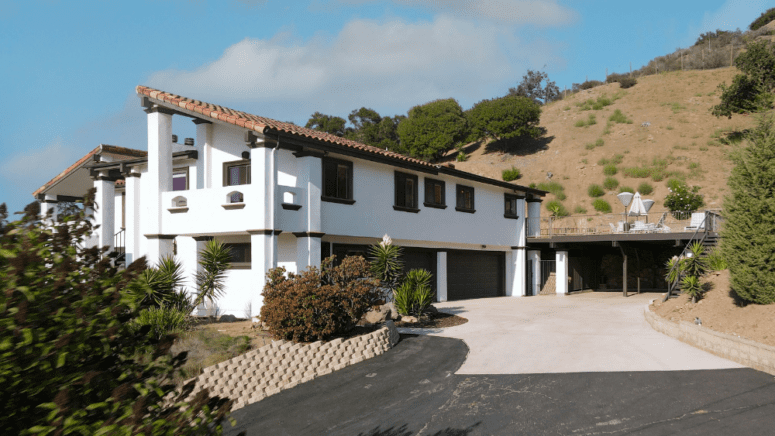How Much Is the Mortgage on a Million Dollar House?
- Published on
- 8 min read
-
 Richard Haddad Executive EditorClose
Richard Haddad Executive EditorClose Richard Haddad Executive Editor
Richard Haddad Executive EditorRichard Haddad is the executive editor of HomeLight.com. He works with an experienced content team that oversees the company’s blog featuring in-depth articles about the home buying and selling process, homeownership news, home care and design tips, and related real estate trends. Previously, he served as an editor and content producer for World Company, Gannett, and Western News & Info, where he also served as news director and director of internet operations.
If you played Monopoly as a child, it’s likely you grew up thinking a million-dollar home was a luxury few people could afford. But in today’s housing market, it’s becoming more common, especially in areas like Los Angeles, where nearly 64% of the homes for sale are priced at $1 million or more. As you roll the homeownership dice, you may be wondering, “What is the mortgage on a million dollar house?”
How much is the mortgage on a million-dollar house?
Based on a 30-year fixed mortgage rate of around 6.9%, and accounting for required down payments and conforming loan limits, your base monthly mortgage payment on a million-dollar house would likely be between $5,000 and $6,500 if it’s located in a typical U.S. city.
However, Denise Madan, a luxury home real estate agent in Flordia with 25 years of experience, explains that this does not include other costs, such as taxes and insurance. “If the house was in a community with an HOA and if the property taxes were higher than average, you could expect to pay closer to $7,000,” she says.
In addition, if the home you are buying is in a housing market that the federal government designates as a “high-cost area,” your payment may be even higher because you can finance more of the home’s purchase price.
You see, to keep our estimates above within real-life situations, we based our initial calculations on a $766,550 mortgage loan. This is because, if you finance a million-dollar home, it’s likely you’ll be dealing with something called conforming loan limits.
What are conforming loan limits?
A conforming loan is a mortgage that “conforms” to the guidelines set forth by Freddie Mac and Fannie Mae, large companies that guarantee most of the mortgages made in the U.S. A non-conforming mortgage is a loan that, because of its larger size, typically cannot be sold by a bank to Freddie Mac or Fannie Mae.
Each year, the Federal Housing Finance Agency (FHFA) sets a conforming loan limit for these government-sponsored enterprises (GSEs). The FHFA adjusts the limit amounts every November for the upcoming year to reflect changes in the ever-evolving housing market. The goal is to be certain the average U.S. homebuyer can obtain a conventional mortgage loan, even as housing costs go up.
The conforming loan limits for one-unit properties in 2024 are:
- Baseline: $766,550
- High-cost areas: $1,149,825
These figures represent the ceiling loan limit for one-unit (single-family) homes. Examples of high-cost locations eligible for the higher conforming loan limits are San Francisco, New York City, and Washington.
In short, the conforming loan limit is a cap on the size of a mortgage loan that Freddie Mac and Fannie Mae will purchase or guarantee for a homebuyer.
Million-dollar house mortgage payment examples
Adjusting for the conforming loan limits, below are two tables that break down your estimated monthly payments on a million-dollar house in a baseline area, and in a designated high-cost area.
Estimated payments on a million-dollar house (baseline area)
The table below reflects principal, plus interest for a conventional 30-year fixed loan of $766,550, the amount you might expect to finance when purchasing a million-dollar home in a baseline area with typical housing costs. Estimates shown assume you are not required to pay private mortgage insurance.
| Interest rate | Principal and interest only | With taxes and insurance |
| 5.0% | $4,115 | $5,573 |
| 5.25% | $4,233 | $5,691 |
| 5.50% | $4,352 | $5,810 |
| 5.75% | $4,473 | $5,931 |
| 6.0% | $4,596 | $6,054 |
| 6.25% | $4,720 | $6,178 |
| 6.50% | $4,845 | $6,303 |
| 6.75% | $4,972 | $6,430 |
| 7.0% | $5,100 | $6,558 |
| 7.25% | $5,229 | $6,687 |
| 7.50% | $5,360 | $6,818 |
| 7.75% | $5,492 | $6,950 |
| 8.0% | $5,625 | $7,083 |
Source for estimate taxes and insurance: U.S. Bank
Estimated payments on a million-dollar house (high-cost area)
Now let’s look at monthly payment estimates if you financed a full million dollars on a home located in a designated high-cost area. In the example table below, we used a home with a selling price of $1,250,000 and a deposit of $250,000 (20%), so you are financing $1,000,000 with no required private mortgage insurance.
| Interest rate | Principal and interest only | With taxes and insurance |
| 5.0% | $5,368 | $6,826 |
| 5.25% | $5,522 | $6,980 |
| 5.50% | $5,678 | $7,136 |
| 5.75% | $5,836 | $7,294 |
| 6.0% | $5,996 | $7,484 |
| 6.25% | $6,157 | $7,616 |
| 6.50% | $6,321 | $7,779 |
| 6.75% | $6,486 | $7,944 |
| 7.0% | $6,653 | $8,111 |
| 7.25% | $6,822 | $8,280 |
| 7.50% | $7,992 | $8,450 |
| 7.75% | $7,164 | $8,622 |
| 8.0% | $7,338 | $8,796 |
Source for estimate taxes and insurance: U.S. Bank
FAQ on buying a million-dollar house
How much do you need to earn to qualify for a $1 million home loan?
According to one estimate by Fortune magazine, in order to qualify for a $1,000,000 mortgage loan, you need to earn between $195,000 and $210,000 annually or roughly about $16,300 per month in income. This is based on a scenario of a 30-year, fixed-rate mortgage with a 20% downpayment, or $200,000.
What interest rate will I pay on a million-dollar house?
Madan explains that, no matter the price of a home, mortgage lenders adjust interest rates depending on risk. A loan with more risk typically carries a higher interest rate.
“Let’s say you and another borrower go to get a loan, and you have a 680 credit score, and the other borrower has a 780 credit score. If you’re going to be buying the same house, the chance of the other borrower getting a more favorable interest rate is probably going to be better.”
While shopping for the best rate is always a good idea, the lowest mortgage interest rates will typically be offered to borrowers with a credit score of 740 or higher.
Do lenders have different eligibility requirements for million-dollar homes?
Madan says lenders typically apply the same rules to borrowers whether they’re shopping for a million-dollar home or a $300,000 home.
“They look at your work history. They ask for your pay stubs, that’s really important. How much debt do you have? Are you a single buyer, or are you buying it with someone? They look at do you have the money in the bank to put the down payment or are you getting a gift,” Madan says. “And then from there, they do their homework. It’s really based on what you make and how much debt you have — your debt-to-income ratio.”
Beyond these expected eligibility requirements, Madan says one of the biggest outside qualifiers relates to current homeowners with existing equity.
“They know they’re going to be selling their home, and they’re taking that cash. They’ll pay off the mortgage that they have and roll it to the new home.” She adds that for anyone considering a million-dollar home, “I would tell anyone to talk to a lender, and you sit down with them.”
What do million-dollar home shoppers worry about most?
“We all have the same concerns,” says Madan. “What’s going to happen with the market? What if I need to sell the home a year from now? If I sell my home now and make a profit, will I be able to turn around and buy a similar home I can afford because the interest rate will be higher? So I think we all have the same concerns.”
She explains that most real estate worries are related to timing. “You never want to sell your home during a down market. But there are many hundreds, thousands of people that have to. I think a million dollar buyer has the same worries as a $300,000 buyer. You wonder what the market’s going to be, and you want to feel confident that you’re going to have a job.”
What is the best advice when shopping for a million-dollar house?
Madan recommends you work with a Realtor who knows the market. “An experienced agent will know the differences and what to expect in a million-dollar home; how it might compare to a $500,000 home or what finishes or [upgrades] make it a million-dollar home.”
She adds that the right agent will also consider the future of your investment. “You need an agent that knows the neighborhood and knows if it’s a solid location in terms of value. Is it going to stay this way, or is it going through a transition?”
Make the most of your million-dollar house purchase
“A home that sold two years ago for a million dollars is going to cost you probably a million and a half now,” Madan says. But she doesn’t share this sentiment as a discouragement, but rather to underscore the opportunities that can be found if you are able to invest in a million-dollar home. “Timing is everything when it comes to real estate,” she adds.
HomeLight can connect you with top-rated agents familiar with million-dollar homes in your desired location. Our free Agent Match platform analyzes over 27 million transactions and thousands of reviews to determine which agent is best for you based on your needs.
Header Image Source: (Oak + Motion/ Unsplash)
- "What is a debt-to-income ratio?", Consumer Financial Protection Bureau (August 2023)
- "What your salary needs to be to afford a $1 million home", Fortune (January 2024)
- "What is private mortgage insurance?", Consumer Financial Protection Bureau (August 2023)
- "What are the conforming loan limits for 2024?", Business Insider (January 2024)
- "What are conforming loan limits, and why are they increasing?", U.S. Bank (November 2023)
- "What is a High-Cost Area?", homebuyer.com (January 2024)
- "5 U.S. cities where more than half the homes for sale cost over $1 million—4 are in California", CNBC (July 2023)


